[EDRM’s Editor’s Note: This article was first published here on August 5, 2024, and EDRM is grateful to Rob Robinson, editor and managing director of Trusted Partner ComplexDiscovery, for permission to republish.]
ComplexDiscovery’s Editor’s Note: The Summer 2024 eDiscovery Pricing Survey by ComplexDiscovery OÜ, conducted in partnership with the Electronic Discovery Reference Model (EDRM), now in its twelfth edition, continues to provide an invaluable resource for understanding the pricing dynamics within the eDiscovery ecosystem. This non-scientific survey, initiated in the winter of 2019, has evolved to become a benchmark tool for professionals in the fields of cybersecurity, information governance, and legal discovery. The survey’s methodology, emphasizing a significant response rate with minimal outreach, ensures that the findings are both comprehensive and relevant to current market conditions.
One of the survey’s strengths lies in its accumulated respondent base of 898 individuals, offering a robust and diverse perspective on pricing trends. Its focus spans key eDiscovery tasks, such as collection, processing, and review, providing detailed insights into each segment’s cost structure. The survey’s approach, combining direct questions with options for alternative pricing models, reflects the evolving nature of the eDiscovery landscape, acknowledging the increasing complexity and specialization of services.
The results of the Summer 2024 survey with 61 respondents are particularly telling, highlighting a shift towards more flexible and technology-adaptive pricing models. This shift is indicative of the industry’s response to emerging challenges and opportunities, such as the growing volume of digital data and the advancement of technologies like predictive coding in document review.
It’s important to note that while the survey offers a comprehensive overview of pricing trends, its non-scientific nature means it should be used as a guide rather than a definitive pricing standard. The survey results provide valuable insights for eDiscovery professionals, assisting them in making informed decisions and strategically navigating the complex pricing landscape of eDiscovery services.
The Summer 2024 eDiscovery Pricing Survey, conducted by ComplexDiscovery OÜ in partnership with the Electronic Discovery Reference Model (EDRM), draws on insights from 61 industry professionals to provide a detailed analysis of current pricing trends in the eDiscovery industry. Since its inception in 2019, the ongoing survey series has amassed data from 898 individual responses over 12 surveys. This report offers an in-depth look at the pricing dynamics for key eDiscovery tasks, including collection, processing, and review, highlighting the unique trends and challenges in each segment.
The following sections from the Summer 2024 survey examine specific pricing areas, providing valuable insights that can assist professionals in cybersecurity, information governance, and legal discovery.
Detailed Collection Pricing Analysis (Figures 1-3)
- Onsite Collection: The per hour cost for onsite collection by a forensic examiner predominantly falls between $250 and $350, as reported by 59.0% of respondents. This reflects the need for specialized skills and equipment.
- Remote Collection: Remote collection shows a broader distribution of costs, with 45.9% indicating per hour costs between $250 and $350, and 31.1% reporting less than $250. This variation highlights the efficiency and cost benefits associated with remote operations.
- Device-Specific Collections: Costs for desktop/laptop and mobile device collections remain high. For desktop/laptop collections, 45.9% of respondents report costs greater than $350 per device, while 47.5% cite similar costs for mobile device collections, underscoring the technical complexities involved.
- Investigative Services and Expert Testimony: For investigation, analysis, and report generation, 45.9% of respondents charge between $350 and $550 per hour. Expert witness testimony commands higher rates, with 49.2% charging between $350 and $550 per hour and 19.7% exceeding $550 per hour.
Collection Pricing: Trends and Implications
The comparison between the Winter 2024 and Summer 2024 surveys reveals several shifts in collection pricing. Onsite collection costs have seen a slight diversification, with more respondents indicating both lower and higher cost brackets. Specifically, the proportion of respondents reporting per hour costs of less than $250 increased from 5.3% to 11.5%, while those indicating costs greater than $350 rose from 9.2% to 13.1%. This suggests that while specialized and urgent onsite collections remain premium services, there is also an emerging trend of cost-competitive offerings, possibly driven by increased market competition or the availability of more efficient technologies.
This shift is indicative of the industry’s response to emerging challenges and opportunities, such as the growing volume of digital data and the advancement of technologies like predictive coding in document review.
Rob Robinson, Editor and Managing Director of ComplexDiscovery.
Remote collection has experienced a significant decrease in costs, with 31.1% of respondents in the Summer 2024 survey reporting per hour costs of less than $250, compared to 15.8% in Winter 2024. This trend indicates growing adoption and confidence in remote collection methods, driven by advancements in technology that make remote operations more efficient and cost-effective.
Device-specific collection costs for desktops, laptops, and mobile devices have also seen a slight reduction in higher cost reports. For instance, the cost for desktop/laptop collections greater than $350 per device decreased from 51.3% to 45.9%. Similarly, mobile device collection costs over $350 per device decreased from 50.0% to 47.5%. These changes may reflect improved tools and methodologies for handling diverse data sources, leading to cost savings.
In terms of investigative services and expert testimony, the market has seen a slight shift towards lower and alternative pricing models. The proportion of respondents charging between $350 and $550 per hour for investigation, analysis, and report generation decreased from 53.9% to 45.9%, indicating a potential push towards more competitive pricing or alternative fee structures that better align with client needs.
Comprehensive Processing Pricing Analysis (Figures 4-9)
- Cost Efficiency in Large Volume Processing: For data volumes over 251 GB, 49.2% of respondents report processing costs at the ingestion stage as less than $25 per GB. This cost efficiency continues at the completion of processing, where 63.9% charge less than $100 per GB, demonstrating economies of scale in handling large data sets.
- Project Management Pricing: Basic project management support costs between $100 and $200 per hour for 70.5% of respondents, while advanced project management tasks cost more than $200 per hour for 62.3% of respondents, indicating the significant investment required for effective project oversight.
Processing Pricing: Trends and Implications
The processing segment has shown notable cost reductions, especially for larger data volumes. For data volumes over 251 GB, the proportion of respondents reporting ingestion costs of less than $25 per GB increased from 32.9% in Winter 2024 to 49.2% in Summer 2024. This significant cost efficiency suggests that service providers are achieving greater economies of scale and are passing these savings onto their clients.
Similar trends are observed at the completion of processing. For data volumes over 251 GB, respondents indicating costs less than $100 per GB increased from 46.1% to 63.9%. These trends underscore the enhanced cost-effectiveness of handling large data sets, likely due to advancements in processing technologies and methodologies that streamline the workflow.
Hosting costs have also seen a downward trend. The proportion of respondents reporting hosting costs without analytics for 250 GB or less at less than $10 per GB per month increased from 28.9% to 41.0%. For hosting with analytics, the proportion reporting costs less than $15 per GB per month increased from 35.5% to 50.8%. These reductions highlight increasing market competition and efficiency improvements, making hosting more accessible and affordable.
Project management support costs for eDiscovery have shown some upward movement in mid-range costs. The proportion of respondents charging between $100 and $200 per hour for basic support increased from 56.6% to 70.5%, reflecting the sustained importance of project management in successful eDiscovery projects. For advanced support, the costs remain consistently high, with a slight decrease in respondents charging more than $200 per hour (64.5% to 62.3%), indicating that while complex project management remains a premium service, there might be efforts to offer more competitive rates.
In-Depth Review Pricing Analysis (Figures 10-12)
- Predictive Coding in TAR: For predictive coding as part of TAR, costs for datasets under 250 GB are less than $75 per GB for 36.1% of respondents and 42.6% for datasets over 251 GB, highlighting cost variations based on dataset size. Alternative pricing models for predictive coding are becoming more prevalent, with 31.1% for datasets under 250 GB and 29.5% for datasets over 251 GB, reflecting a shift towards customized pricing strategies.
- Document Review Costs: Onsite document review costs are higher, with 45.9% exceeding $40 per hour. Remote review is more economical, with 49.2% of respondents reporting costs between $25 and $40 per hour, indicating the growing acceptance and cost benefits of remote review models.
- Per Document Review Costs: Onsite reviews cost more than $1.00 per document for 27.9% of respondents, reflecting the meticulous and labor-intensive nature of the task. Remote reviews show a more balanced cost distribution, with 44.3% reporting costs between $0.50 and $1.00 per document.
Review Pricing: Trends and Implications
The review segment, particularly predictive coding in technology-assisted review (TAR), has witnessed significant cost reductions. For datasets under 250 GB, the proportion of respondents reporting costs less than $75 per GB increased from 21.1% in Winter 2024 to 36.1% in Summer 2024. For larger datasets over 251 GB, this proportion increased from 23.7% to 42.6%. These changes indicate improved affordability and efficiency of predictive coding technologies, making advanced review techniques more accessible to a broader range of cases and clients.
Document review costs have also shown notable trends. Onsite review costs exceeding $40 per hour slightly decreased from 48.7% to 45.9%, while remote review costs in the $25 to $40 per hour range increased from 46.1% to 49.2%. This shift underscores the growing feasibility and acceptance of remote review models, which offer significant cost benefits and access to a broader talent pool.
The cost per document for review has also become more balanced, with a higher proportion of respondents reporting costs between $0.50 and $1.00 per document for remote reviews (27.6% to 44.3%). This trend highlights the increasing cost-effectiveness and competitive pricing in the document review market, driven by technological advancements and process efficiencies.
Demographic Breakdown: Geographical Reach, Business Segments, and Functional Roles of Respondents (Figures 13-15)
The Summer 2024 survey predominantly represents professionals from the United States, accounting for 93.4% of respondents, emphasizing the influence of North American practices on the eDiscovery industry. Other regions such as the United Kingdom and Asia/Asia Pacific are also represented, though to a lesser extent.
Professionals from software and services providers constitute the largest segment at 41.0%, followed by law firms at 27.9%. This highlights the critical role of technology and legal practices in the eDiscovery ecosystem. Consultancies and corporations also contribute significantly, representing 13.1% and 9.8%, respectively.
A majority of respondents (67.2%) are involved in legal or litigation support roles, while 29.5% are in business and business support functions, underscoring the interdisciplinary nature of eDiscovery operations. The remaining 3.3% in IT and product development roles reflect the importance of technological innovation in eDiscovery solutions.
Adapting to Market Implications in eDiscovery
The observed trends in the Summer 2024 survey indicate a market that is becoming increasingly cost-efficient and competitive. The notable cost reductions in processing and review tasks reflect advancements in technology and methodologies, allowing service providers to achieve greater efficiencies and pass these savings onto clients. The growing prevalence of remote operations, both in collection and review, underscores a broader industry shift towards leveraging technology to optimize costs and improve accessibility.
These trends suggest that eDiscovery service providers are continuously innovating to offer more competitive and flexible pricing models, aligning their services with the evolving needs of their clients. For eDiscovery professionals, these insights provide valuable benchmarks for strategic planning and informed decision-making, helping them navigate the complex and dynamic landscape of eDiscovery services.
Summer 2024 eDiscovery Pricing Survey Responses
n=61 Respondents
Collection Pricing
1a. What is the per hour cost for an onsite collection by a forensic examiner?
- Less than $250 per hour. 11.5%
- Between $250 and $350 per hour. 59.0%
- Greater than $350 per hour. 13.1%
- Do not know. 14.8%
- Alternative pricing model for per hour costs. 1.6%
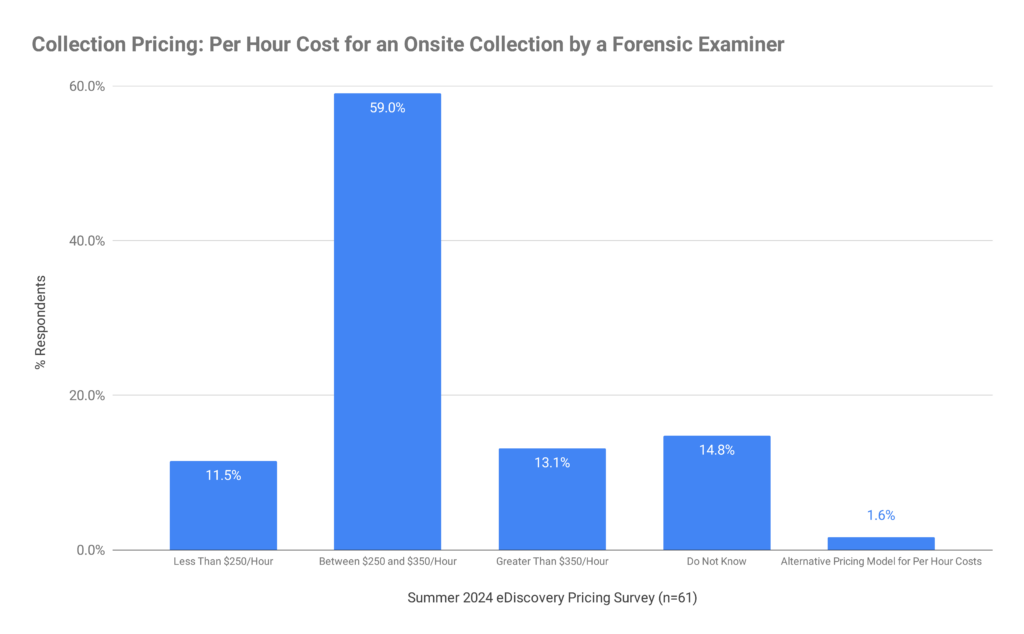
1b. What is the per hour cost for a remote collection by a forensic examiner?
- Less than $250 per hour. 31.1%
- Between $250 and $350 per hour. 45.9%
- Greater than $350 per hour. 4.9%
- Do not know. 14.8%
- Alternative pricing model for per hour costs. 3.3%
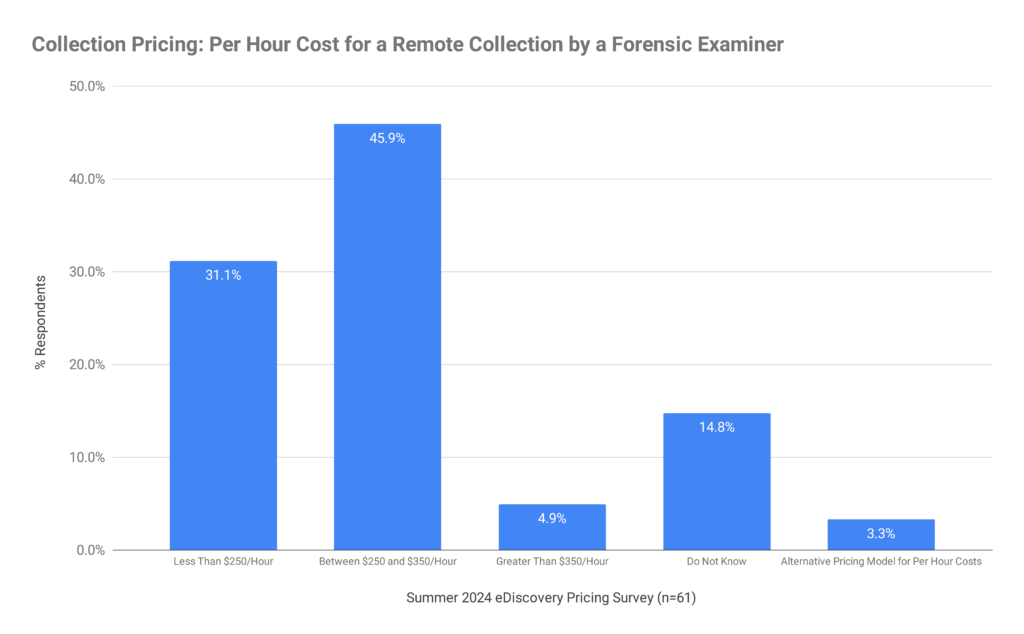
2a. What is the per device cost for a desktop or laptop computer collection by a forensic examiner?
- Less than $250 per device. 13.1%
- Between $250 and $350 per device. 18.0%
- Greater than $350 per device. 45.9%
- Do not know. 13.1%
- Alternative pricing model for per device costs. 9.8%
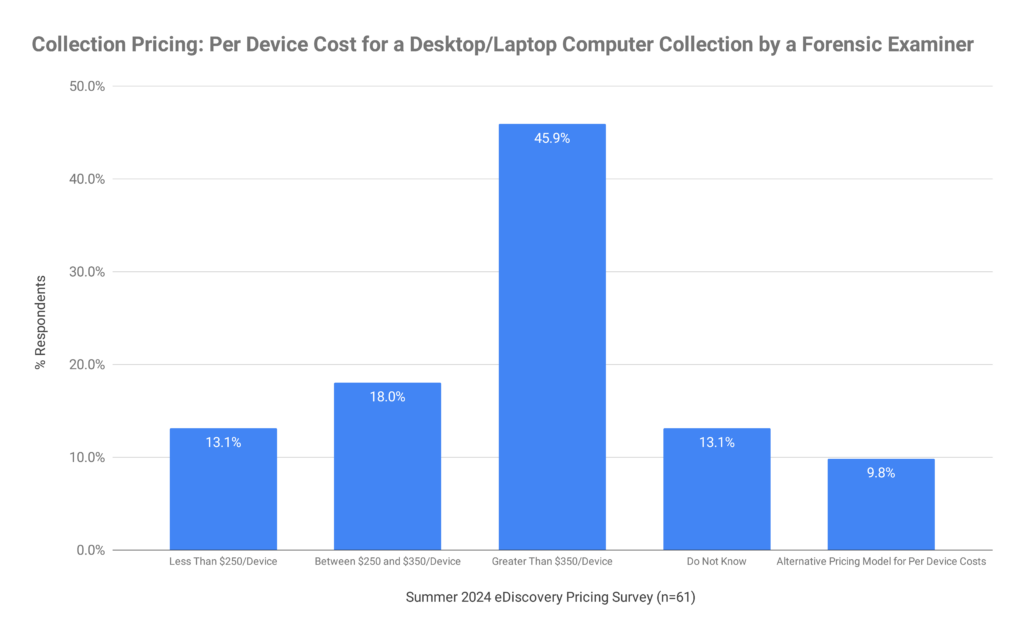
2b. What is the per device cost for a mobile device collection by a forensic examiner?
- Less than $250 per device. 11.5%
- Between $250 and $350 per device. 19.7%
- Greater than $350 per device. 47.5%
- Do not know. 13.1%
- Alternative pricing model for per device costs. 8.2%
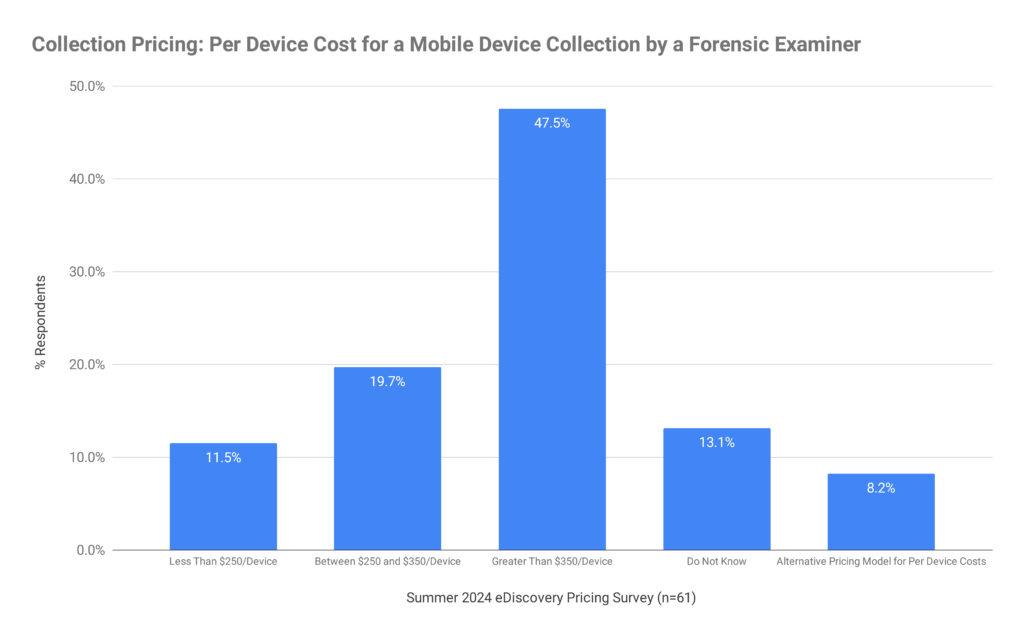
3a. What is the per hour cost for investigation, analysis, and report generation by a forensic examiner?
- Less than $350 per hour. 32.8%
- Between $350 and $550 per hour. 45.9%
- Greater than $550 per hour. 3.3%
- Do not know. 14.8%
- Alternative pricing model for per hour costs. 3.3%
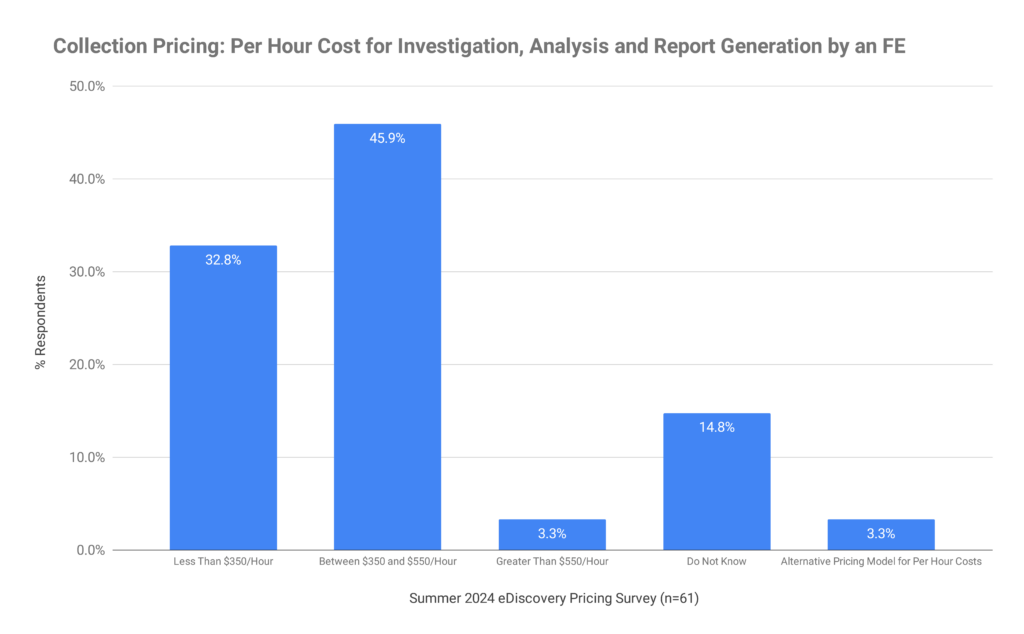
3b. What is the per hour cost for expert witness testimony (in-person and written) by a forensic examiner?
- Less than $350 per hour. 11.5%
- Between $350 and $550 per hour. 49.2%
- Greater than $550 per hour. 19.7%
- Do not know. 16.4%
- Alternative pricing model for per hour costs. 3.3%
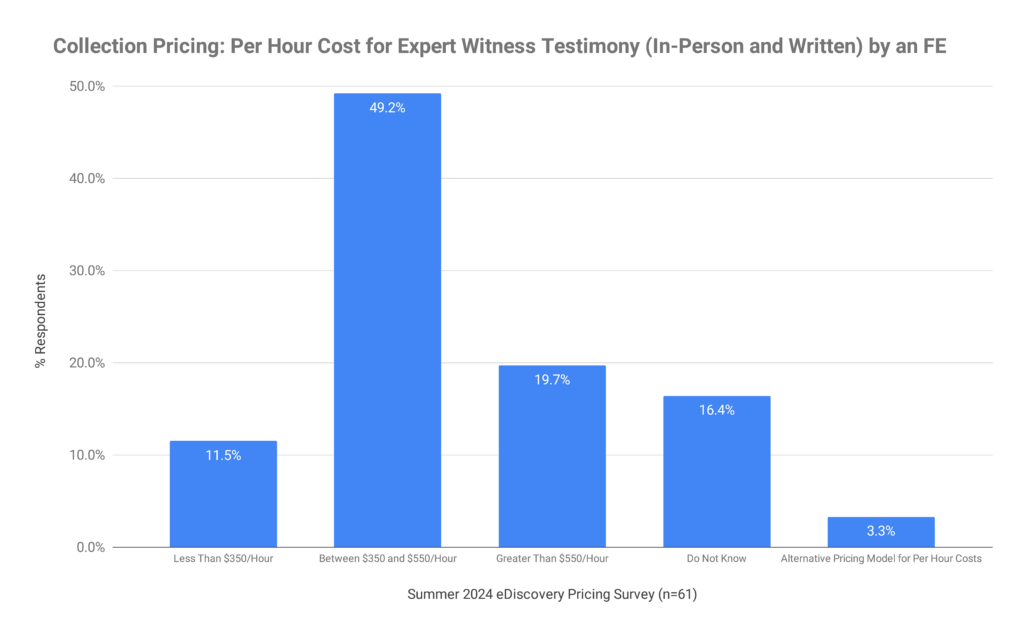
Processing Pricing
4a. What is the per GB cost to process electronically stored information based on volume at ingestion for 250 GB or less?
- Less than $25 per GB. 42.6%
- Between $25 and $75 per GB. 34.4%
- Greater than $75 per GB. 8.2%
- Do not know. 9.8%
- Alternative pricing model for per GB costs. 4.9%
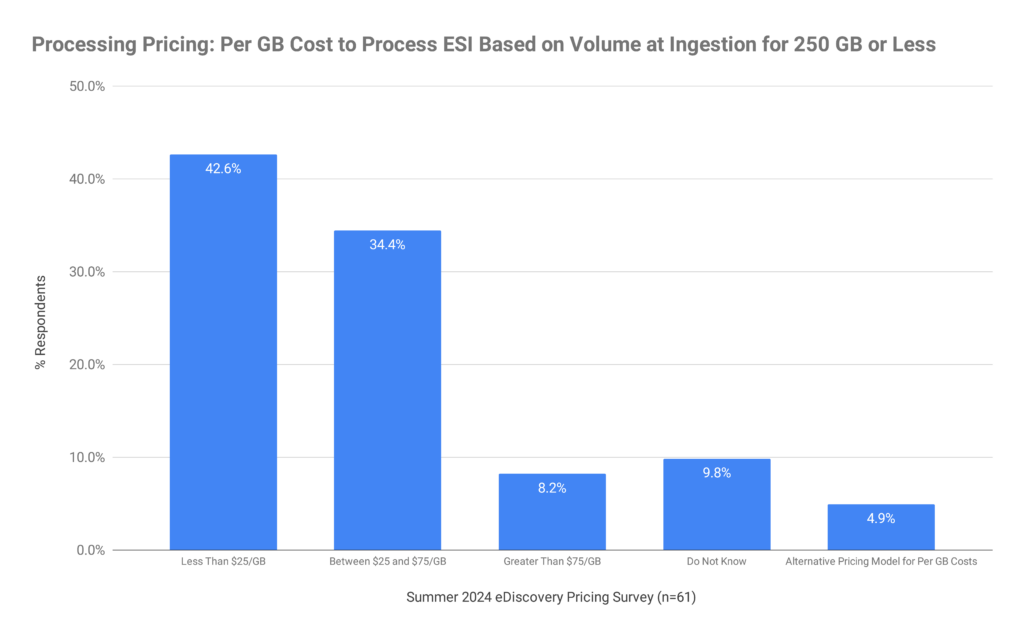
4b. What is the per GB cost to process electronically stored information based on volume at ingestion for 251 GB or more?
- Less than $25 per GB. 49.2%
- Between $25 and $75 per GB. 32.8%
- Greater than $75 per GB. 3.3%
- Do not know. 11.5%
- Alternative pricing model for per GB costs. 3.3%
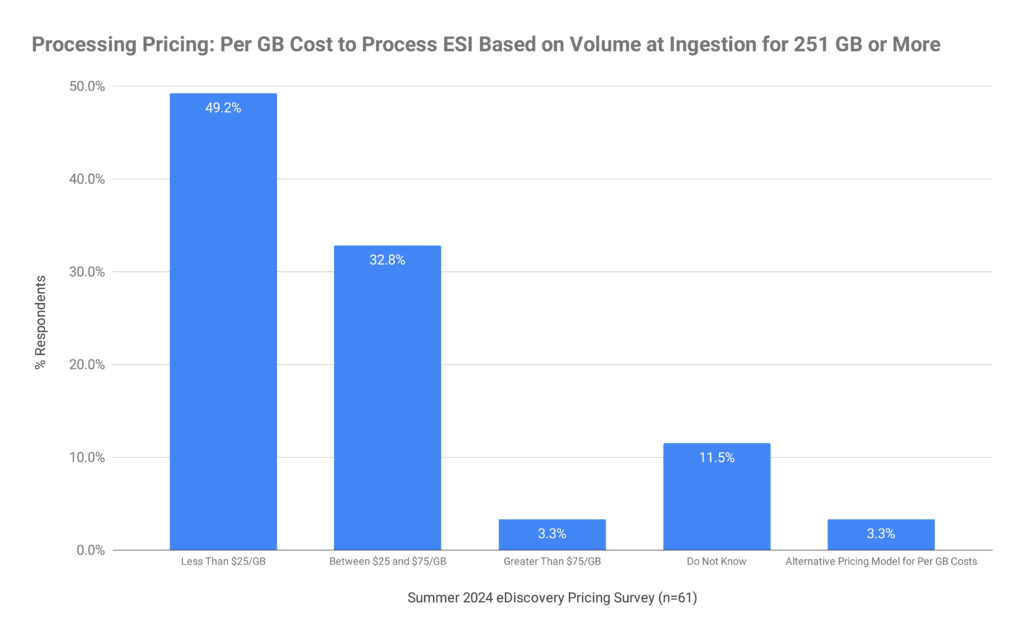
5a. What is the per GB cost to process electronically stored information based on volume at completion of processing for 250 GB or less?
- Less than $100 per GB. 57.4%
- Between $100 and $150 per GB. 18.0%
- Greater than $150 per GB. 3.3%
- Do not know. 13.1%
- Alternative pricing model for per GB costs. 8.2%
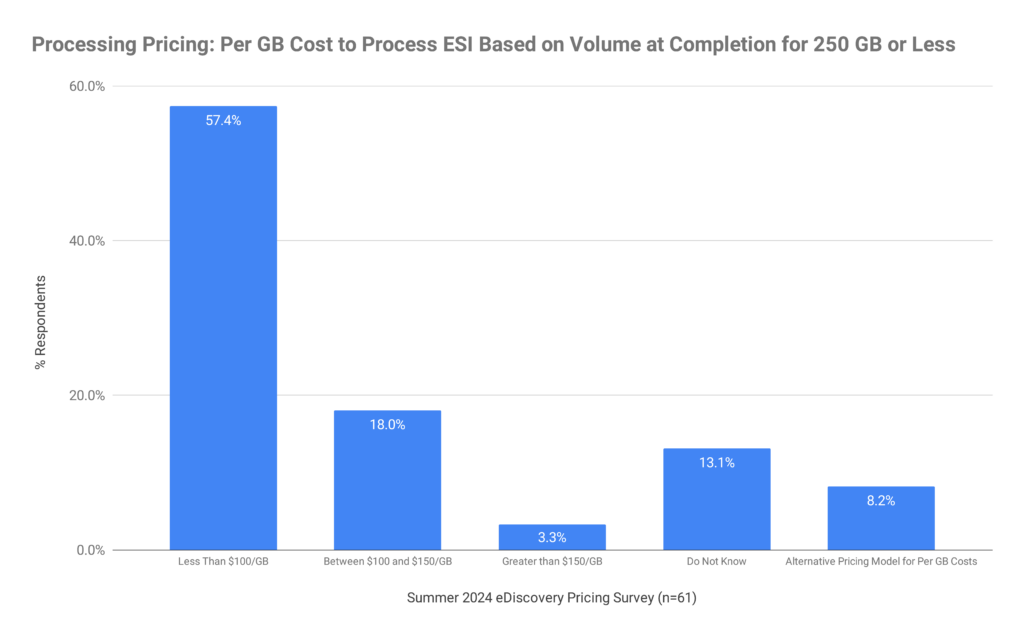
5b. What is the per GB cost to process electronically stored information based on volume at completion of processing for 251 GB or more?
- Less than $100 per GB. 63.9%
- Between $100 and $150 per GB. 13.1%
- Greater than $150 per GB. 1.6%
- Do not know. 13.1%
- Alternative pricing model for per GB costs. 8.2%
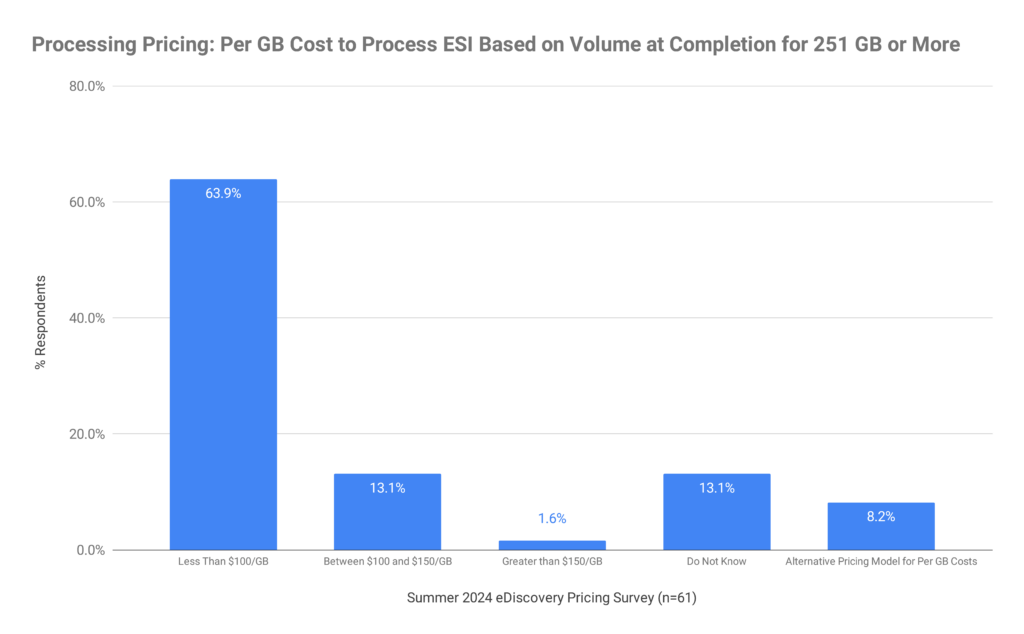
6a. What is the per GB per month cost to host electronically stored information without analytics for 250 GB or less?
- Less than $10 per GB per month. 41.0%
- Between $10 and $20 per GB per month. 37.7%
- Greater than $20 per GB per month. 6.6%
- Do not know. 13.1%
- Alternative pricing model for per GB costs. 1.6%
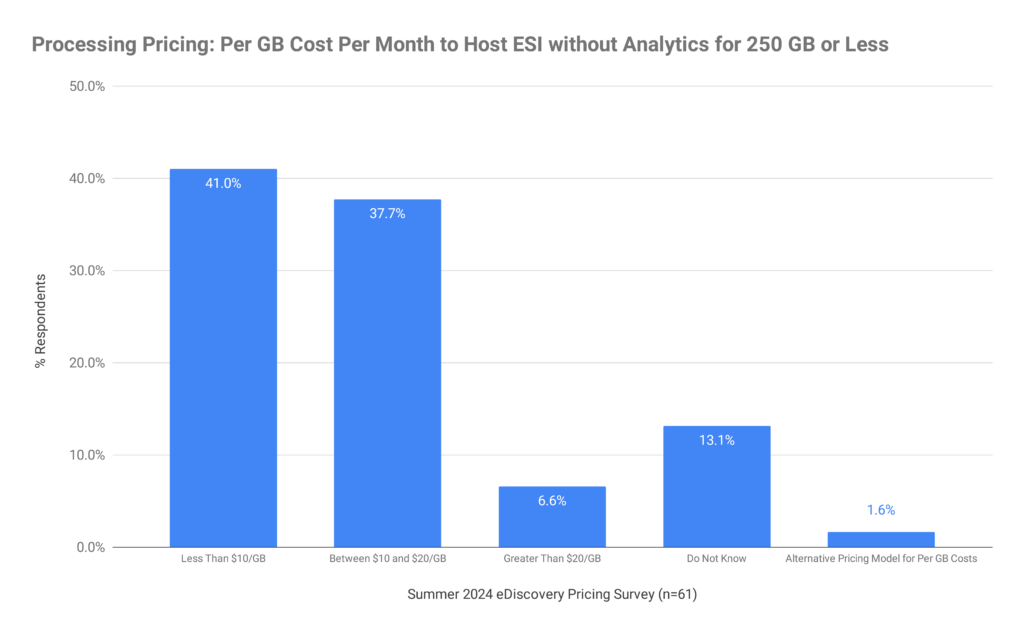
6b. What is the per GB per month cost to host electronically stored information without analytics for 251 GB or more?
- Less than $10 per GB per month. 57.4%
- Between $10 and $20 per GB per month. 24.6%
- Greater than $20 per GB per month. 3.3%
- Do not know. 13.1%
- Alternative pricing model for per GB costs. 1.6%
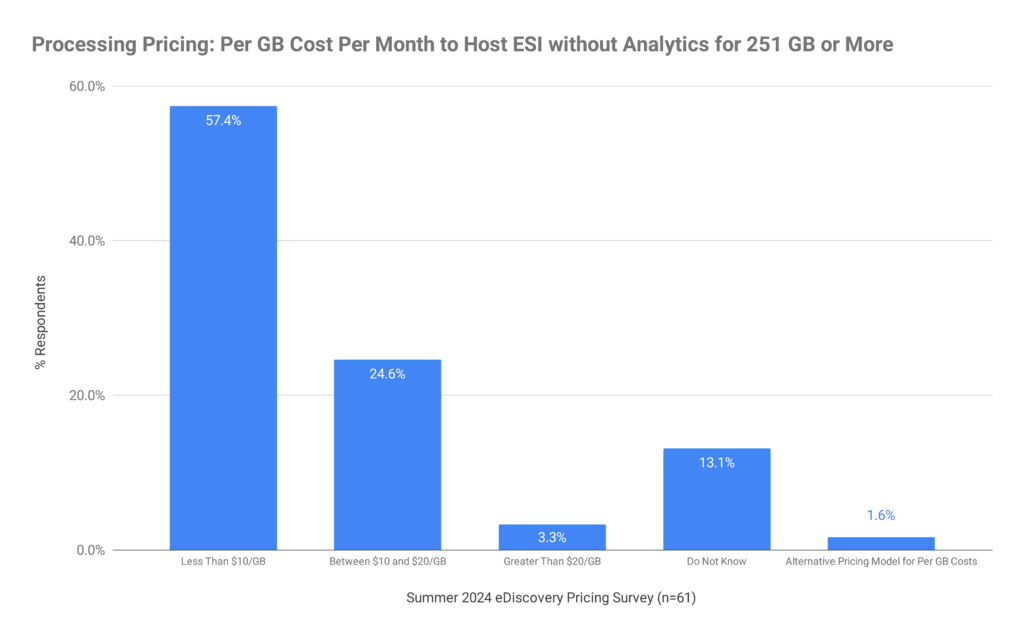
7a. What is the per GB per month cost to host electronically stored information with analytics for 250 GB or less?
- Less than $15 per GB per month. 50.8%
- Between $15 and $25 per GB per month. 27.9%
- Greater than $25 per GB per month. 6.6%
- Do not know. 13.1%
- Alternative pricing model for per GB costs. 1.6%
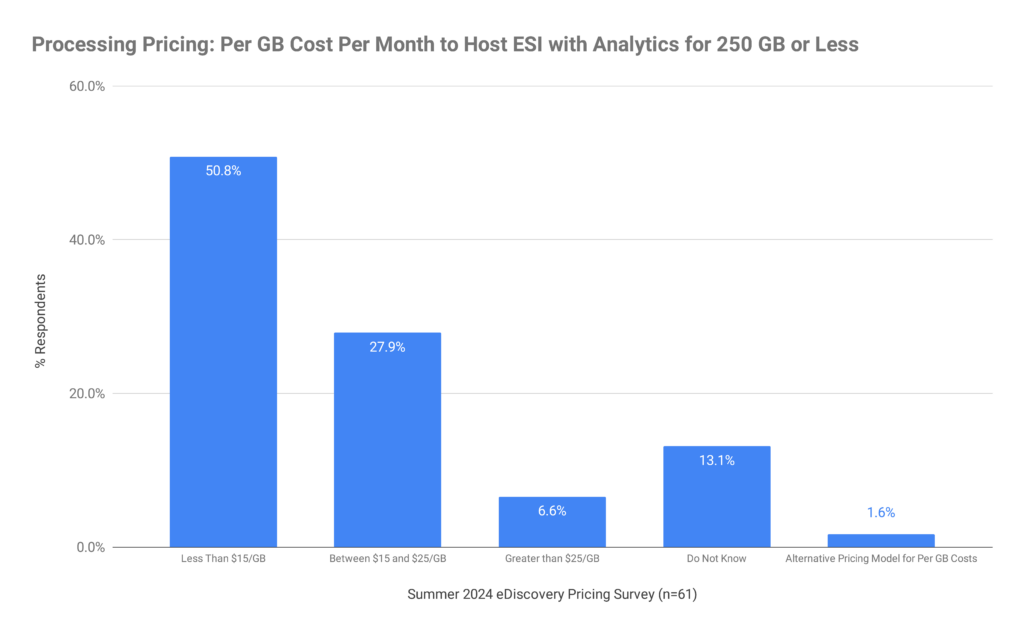
7b. What is the per GB per month cost to host electronically stored information with analytics for 251 GB or more?
- Less than $15 per GB per month. 62.3%
- Between $15 and $25 per GB per month. 19.7%
- Greater than $25 per GB per month. 4.9%
- Do not know. 11.5%
- Alternative pricing model for per GB costs. 1.6%
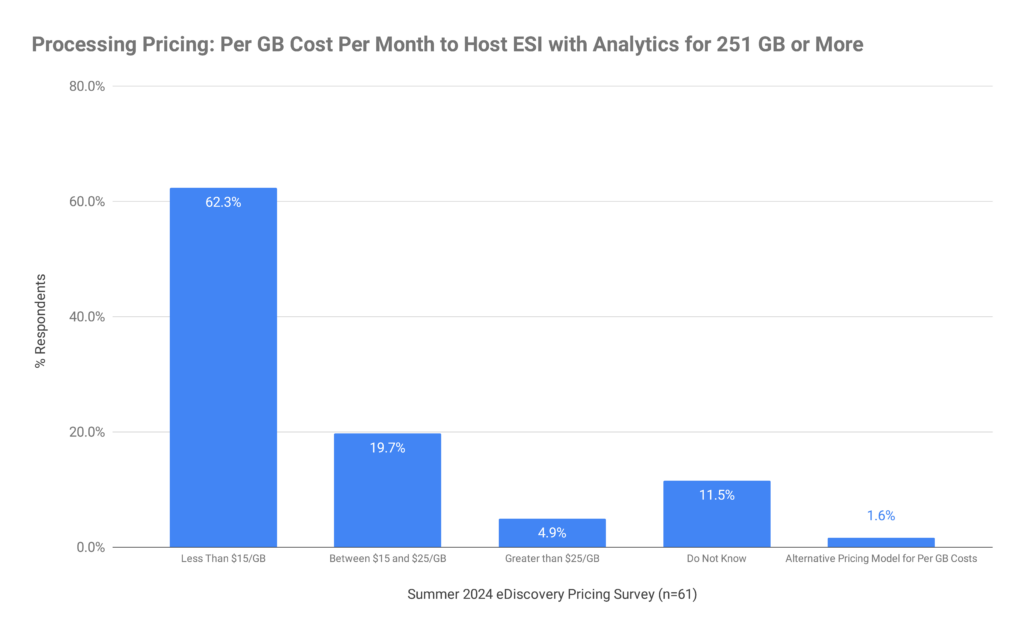
8a. What is the user license fee per month for access to hosted data for 250 users or less?
- Less than $50 per user per month. 14.8%
- Between $50 and $100 per user per month. 55.7%
- Greater than $100 per user per month. 6.6%
- Do not know. 11.5%
- Alternative pricing model for user license costs. 11.5%
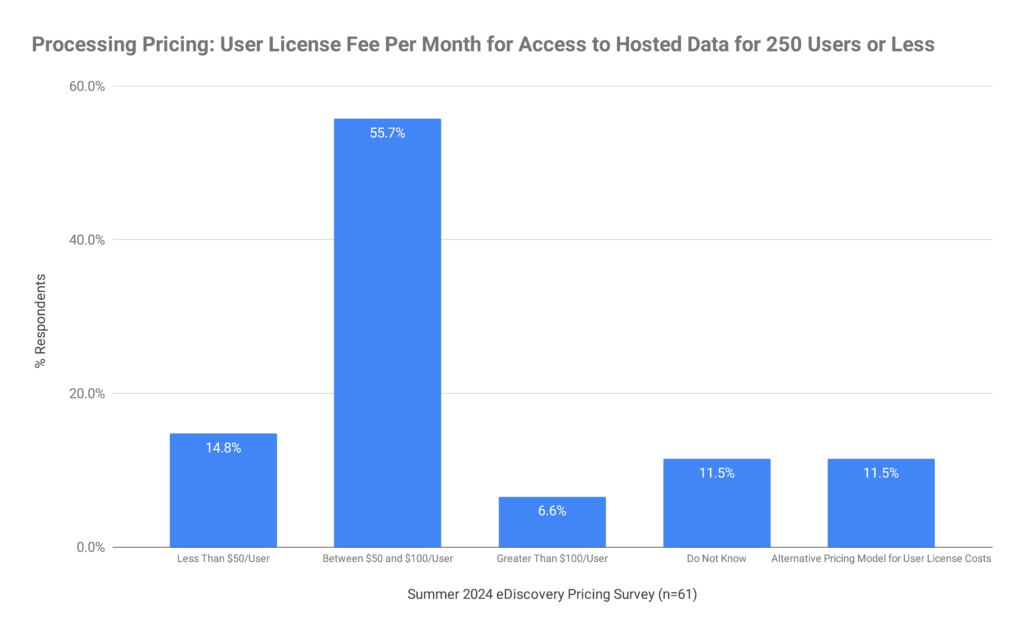
8b. What is the user license fee per month for access to hosted data for 251 users or more?
- Less than $50 per user per month. 18.0%
- Between $50 and $100 per user per month. 54.1%
- Greater than $100 per user per month. 4.9%
- Do not know. 11.5%
- Alternative pricing model for user license costs. 11.5%
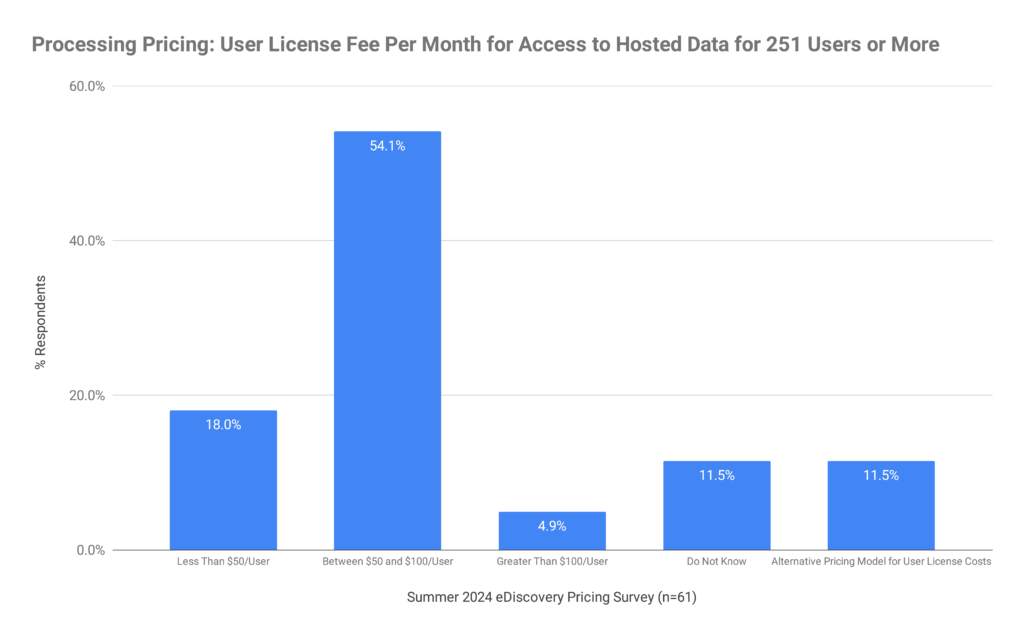
9a. What is the per hour cost of basic project management support for eDiscovery?
- Less than $100 per hour. 3.3%
- Between $100 and $200 per hour. 70.5%
- Greater than $200 per hour. 16.4%
- Do not know. 9.8%
- Alternative pricing model for per hour costs. 0.0%
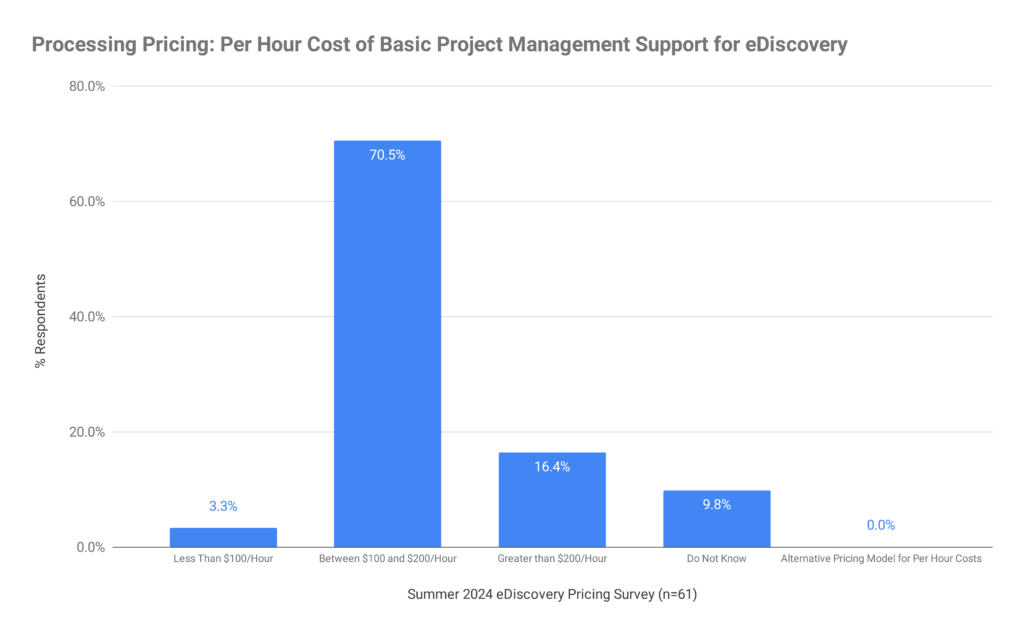
9b. What is the per hour cost of advanced project management support for eDiscovery?
- Less than $100 per hour. 0.0%
- Between $100 and $200 per hour. 27.9%
- Greater than $200 per hour. 62.3%
- Do not know. 9.8%
- Alternative pricing model for per hour costs. 0.0%
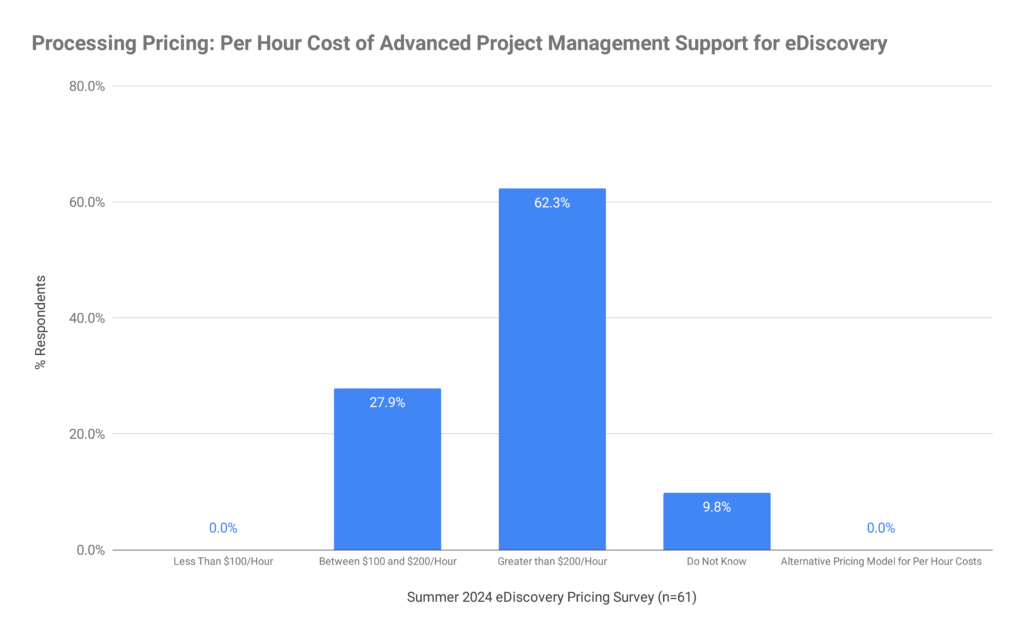
Review Pricing
10a. What is the per GB cost to conduct predictive coding as part of a technology-assisted review for 250 GB or less?
- Less than $75 per GB. 36.1%
- Between $75 and $150 per GB. 14.8%
- Greater than $150 per GB. 3.3%
- Do not know. 14.8%
- Alternative pricing model for per GB costs. 31.1%
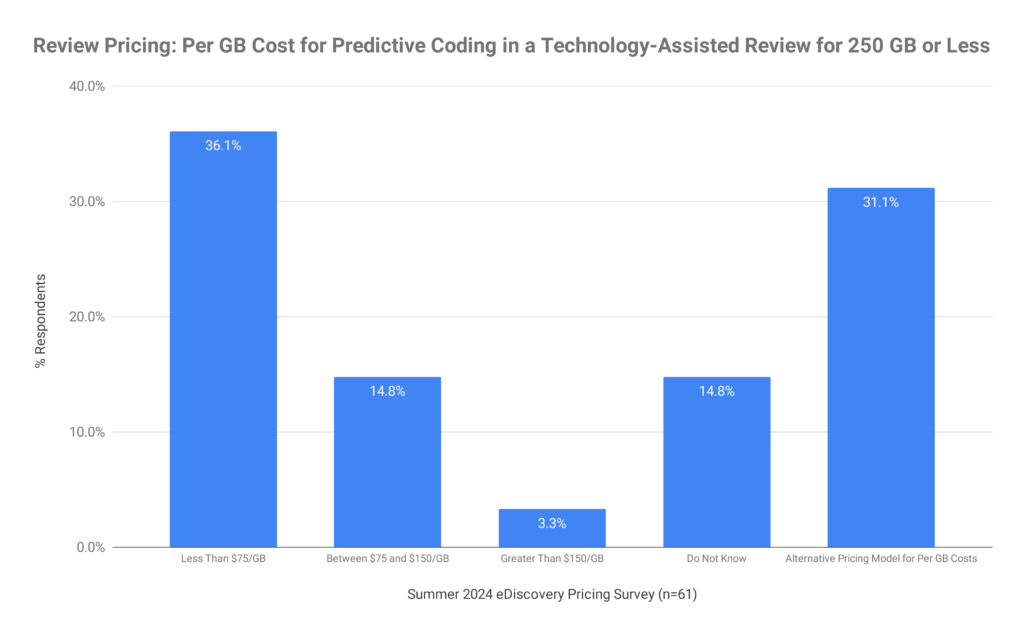
10b. What is the per GB cost to conduct predictive coding as part of a technology-assisted review for 251 GB or more?
- Less than $75 per GB. 42.6%
- Between $75 and $150 per GB. 8.2%
- Greater than $150 per GB. 3.3%
- Do not know. 16.4%
- Alternative pricing model for per GB costs. 29.5%
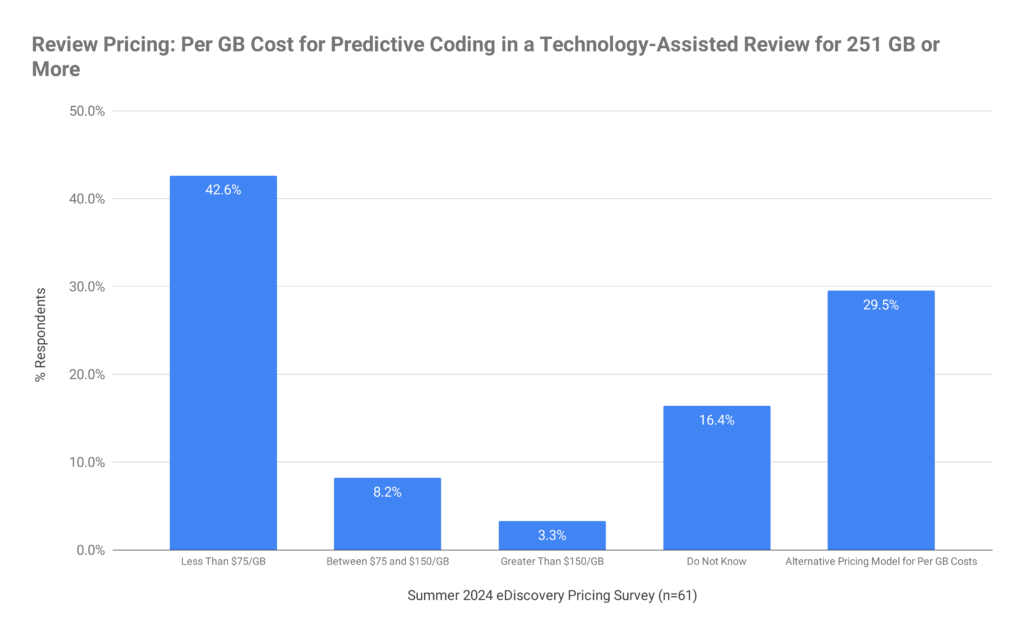
11a. What is the cost per hour for document review attorneys to review documents for an onsite managed review?
- Less than $25 per hour. 6.6%
- Between $25 and $40 per hour. 24.6%
- Greater than $40 per hour. 45.9%
- Do not know. 19.7%
- Alternative pricing model for per hour costs. 3.3%
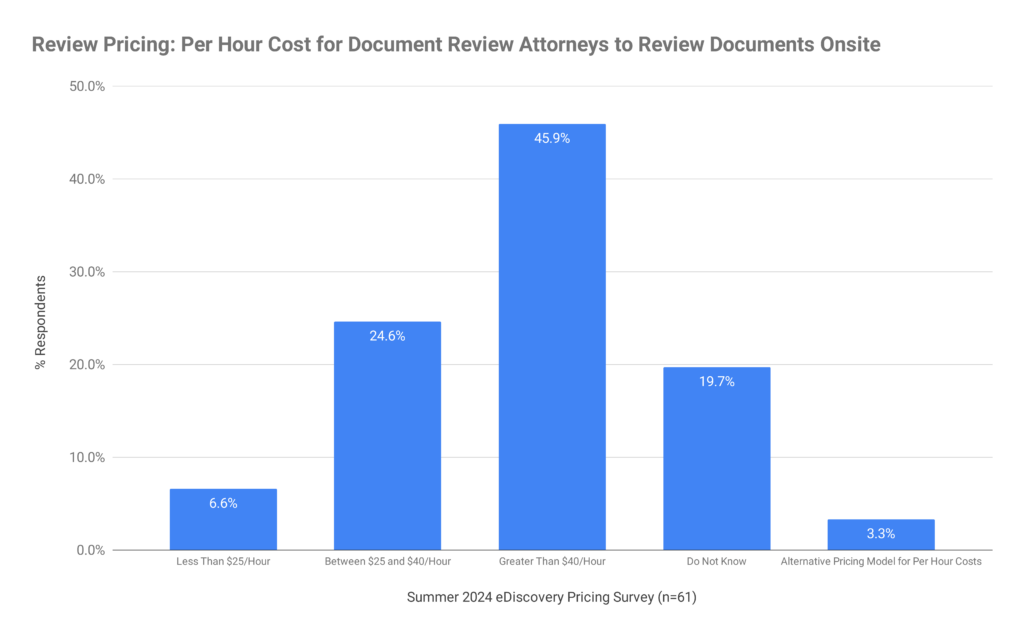
11b. What is the cost per hour for document review attorneys to review documents for a remotely managed review?
- Less than $25 per hour. 8.2%
- Between $25 and $40 per hour. 49.2%
- Greater than $40 per hour. 24.6%
- Do not know. 14.8%
- Alternative pricing model for per hour costs. 3.3%
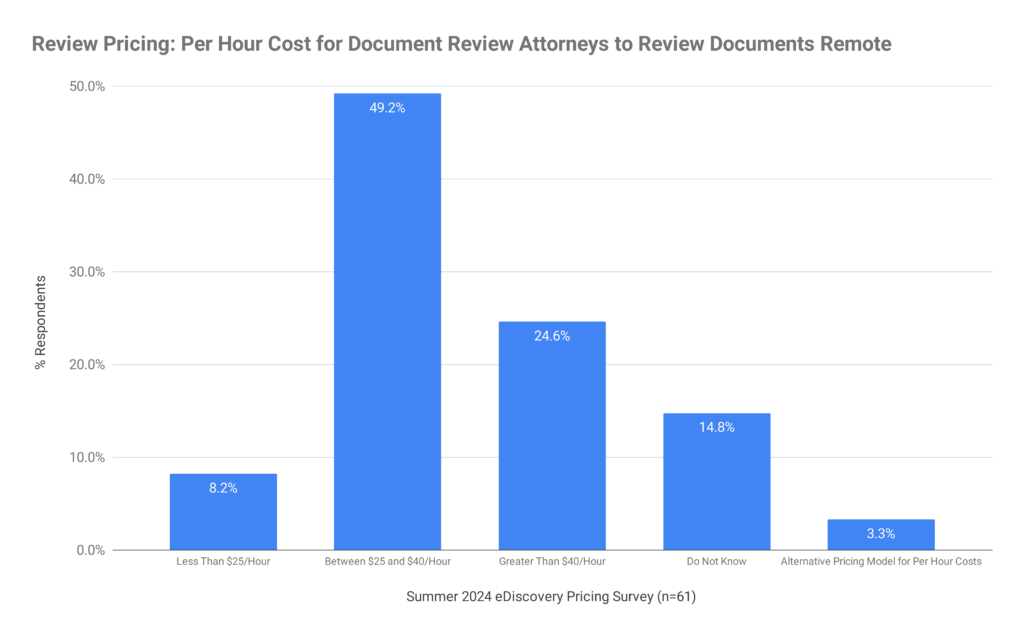
12a. What is the cost per document for document review attorneys to review documents for an onsite managed review?
- Less than $0.50 per document. 6.6%
- Between $0.50 and $1.00 per document. 31.1%
- Greater than $1.00 per document. 27.9%
- Do not know. 24.6%
- Alternative pricing model for per document costs. 9.8%
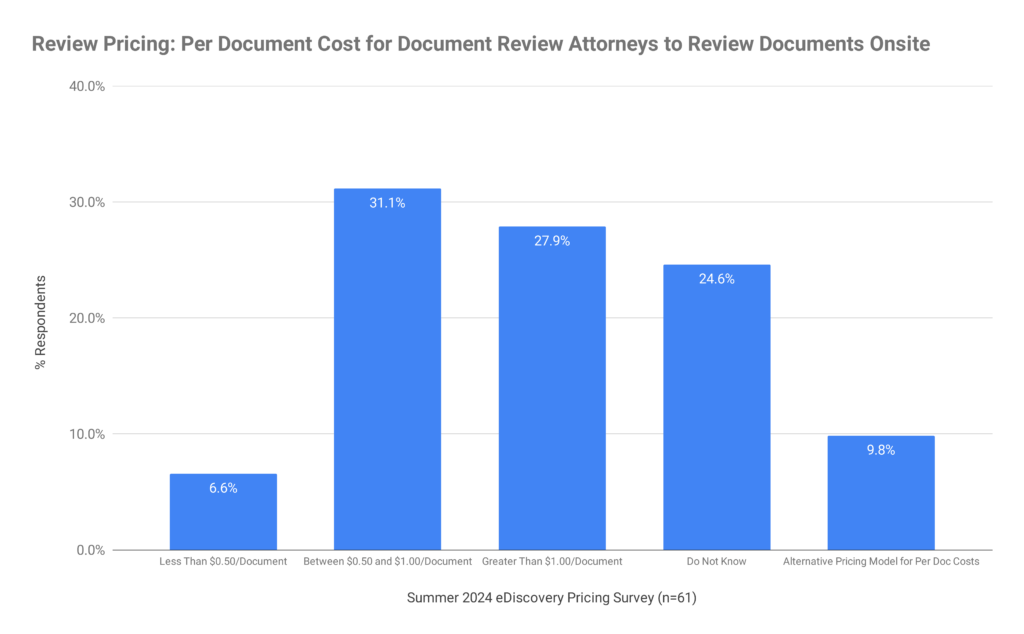
12b. What is the cost per document for document review attorneys to review documents for a remote managed review?
- Less than $0.50 per document. 11.5%
- Between $0.50 and $1.00 per document. 44.3%
- Greater than $1.00 per document. 13.1%
- Do not know. 21.3%
- Alternative pricing model for per document costs. 9.8%
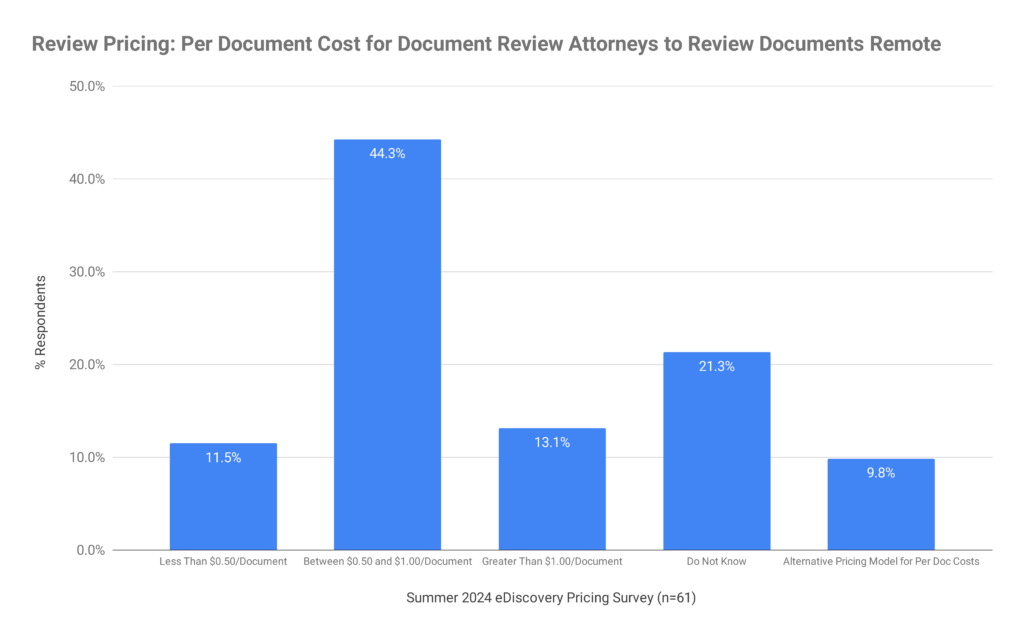
Background Information
13. In which geographical region do you primarily conduct eDiscovery-related business?
- North America – United States. 93.4%
- Europe – United Kingdom. 3.3%
- Asia/Asia Pacific. 3.3%
- Europe – Non-UK. 0.0%
- North America – Canada. 0.0%
- Middle East/Africa. 0.0%
- Central/South America. 0.0%
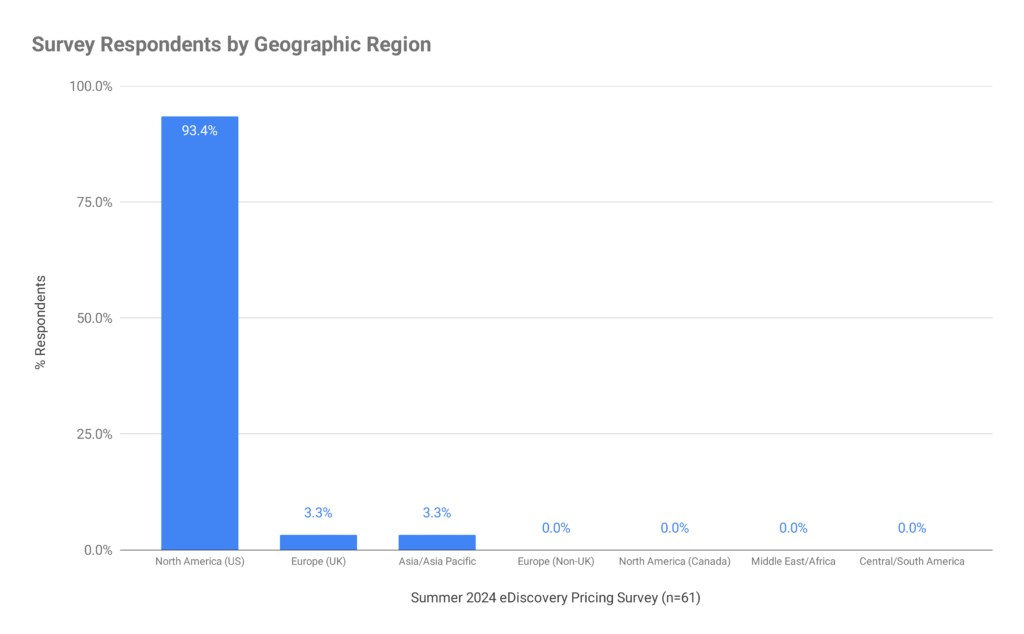
14. Which of the following segments best describes your business in eDiscovery?
- Software and/or Services Provider. 41.0%
- Law Firm. 27.9%
- Consultancy. 13.1%
- Corporation. 9.8%
- Media/Research Organization/Educational Association. 8.2%
- Government Entity. 0.0%
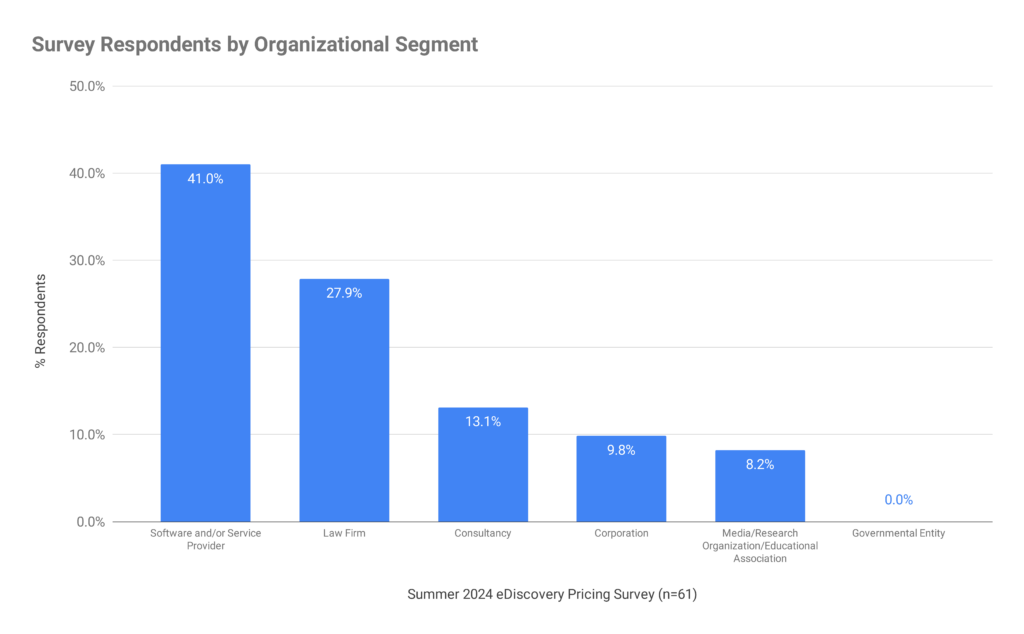
15. What area best describes your primary function in the conduct of your organization’s eDiscovery business?
- Legal/Litigation Support. 67.2%
- Business/Business Support (All Other Business Functions). 29.5%
- IT/Product Development. 3.3%
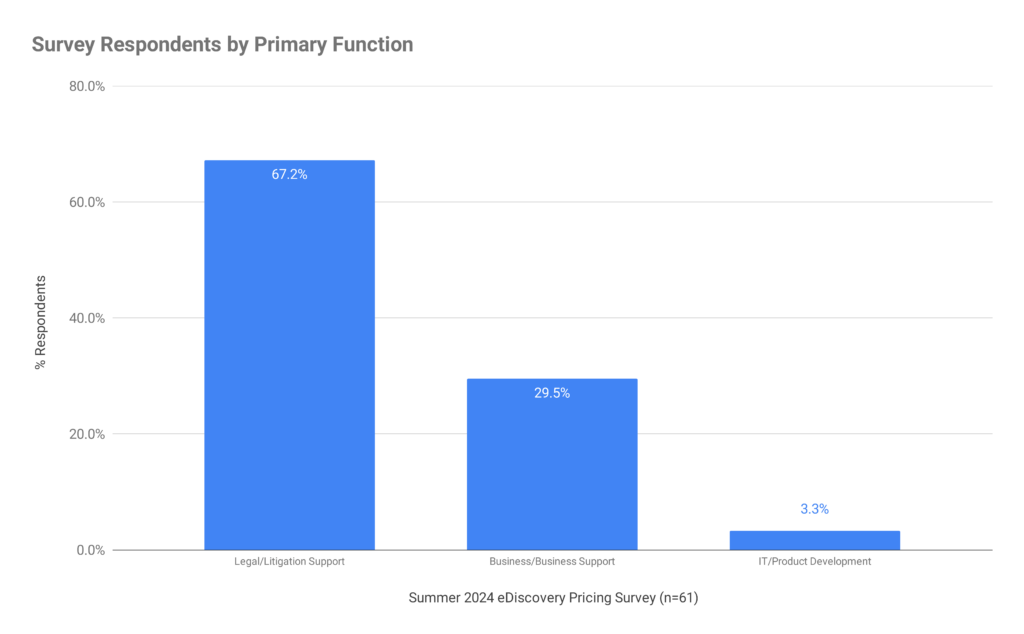
Background: eDiscovery Pricing Survey Respondents by Survey
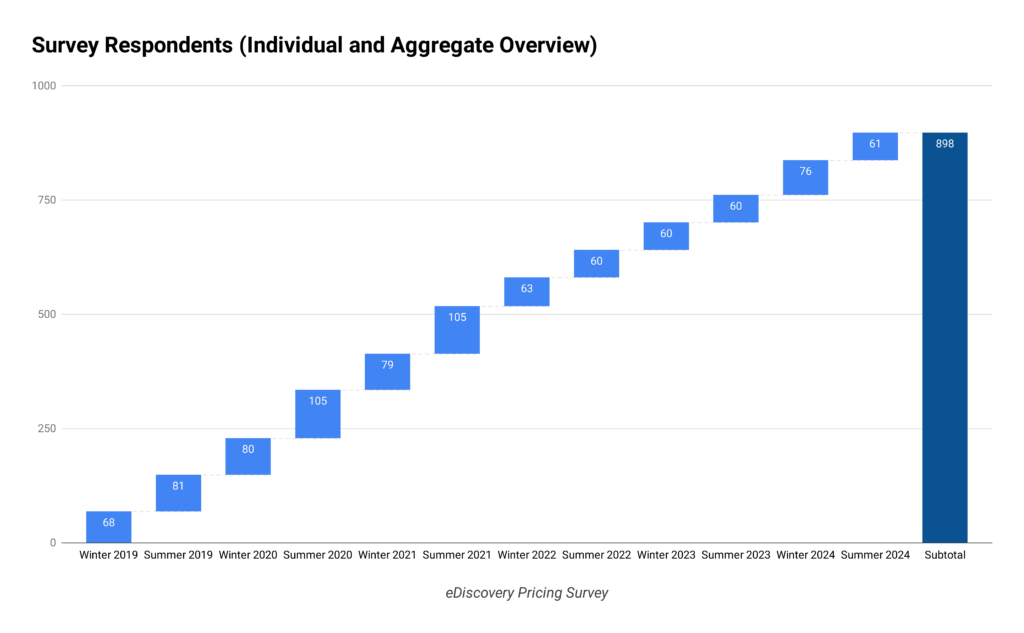
*For the purpose of this ongoing industry survey, price and cost are used interchangeably and represent the amount a customer is willing to pay for the service. However, from a financial and accounting perspective, pricing is the amount a customer is willing to pay. The cost is typically the expense incurred for creating and delivering the service.
**Survey methodology focused on achieving at least 50 responses with the least number of emails sent to the ComplexDiscovery and EDRM industry professional databases. This approach sought to minimize the number of requests for survey participation while ensuring a solid number of responses from which to generally assess market sentiment in survey areas of interest.
Additional Reading
- Shaping eDiscovery Strategies: Winter 2024 Pricing Report
- Peaks and Valleys? Summer 2023 eDiscovery Pricing Survey Results
- ComplexDiscovery Business Confidence Surveys
Read the complete report here.
Assisted by GAI and LLM Technologies per EDRM GAI and LLM Policy.

